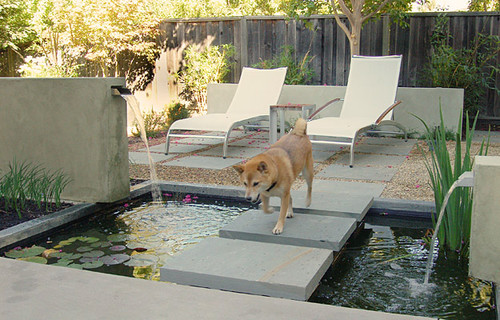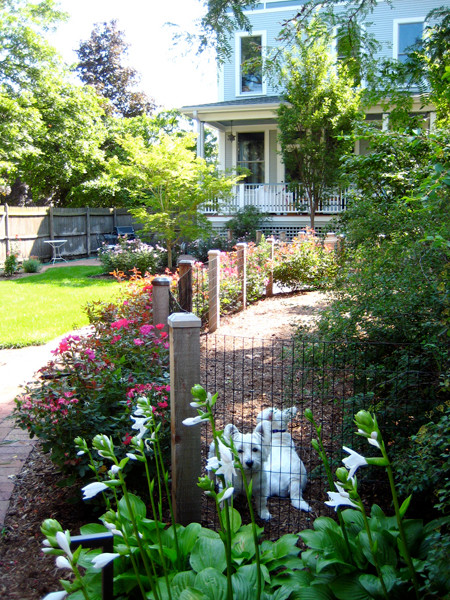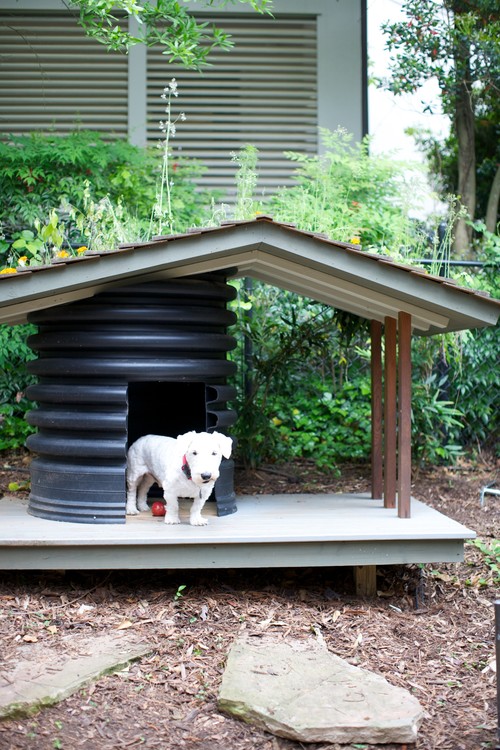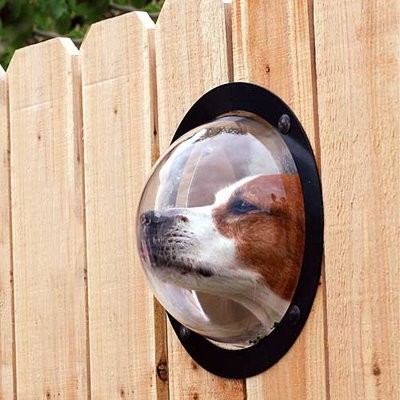×
Email
HOW CAN WE HELP?
6a - 7p Monday - Friday
6a - 2p Saturday
Mountain Time
PHONE
1-877-738-7237
FAX
1-866-777-1434
MAIL
Pets Best
2323 S Vista Ave. Ste. 100
Boise, ID 83705
My Question
First Name
Last Name
Policy (optional)
Phone
Best Day
Best Time
Click here to text customer care
- Pet Insurance
- Blog
- 8 Dog-Approved Backyard Ideas

By Marianne Lipanovich, Houzz.
A dog or dogs happily romping in the backyard is a classic dog-owner dream. Achieving this, though, takes more thought than just sending your dog out in the yard and hoping for the best. Take the time to make sure your yard provides your dog with the amenities he or she needs and loves. Fortunately, pet-friendly yard amenities are also great for people as well.
1. Keep the water flowing. Fresh water, and plenty of it, is essential. Why not take this opportunity to add a water feature to your landscape that your dog can access? A splash fountain or stream is ideal, and you’ll enjoy it, too.
A small pond or pool is another option, especially for water-loving dogs. But before you build or even allow access to an existing pool, do a safety check. Dogs should be able to get out easily if they fall in. This means a gently sloping side or easily accessible shallow steps.
2. Consider safety first. Dogs may have descended from free-ranging wolves, but our domesticated friends do best with boundaries. You might opt for a fully fenced backyard or a dog run within a larger area. Either way, you’ll know your dog is both happy and safe.
A chain-link fence is easy to install and provides a safe enclosure, but it isn’t necessarily the most attractive approach. As an alternative, consider a fencing material that matches your landscape style, whether you’re opting for a fully enclosed yard or a dog run. Go with picket fences for a cottage design, sleek horizontal boards for a contemporary look or posts and wire for a rustic feel.
No matter what style you choose, make sure it is sturdy enough to contain your family friend and designed so a curious dog can’t get stuck between the boards.
3. Provide readily available shade and shelter. This is another essential, as dogs can get sunburn and suffer from heatstroke. A large tree or trees will provide shade, but if trees aren't possible, look into overhead tarps and shade cloths that stretch over part of the area.
If there’s room, add a doghouse. They’ve come a long way from plastic boxes, as a quick look in a pet store or online catalog will show you.
4. Keep your landscaping toxin free. Some common plants are surprisingly dangerous if dogs eat them, including azaleas, lilies and mums. Check with your vet and the ASPCA for a list of plants that can irritate or even kill your pet.
Garden Alert: 22 Plants to Keep Away From Pets
Landscaping materials and chemical controls can also cause problems. While mulch is a great choice for a garden and mostly soft on paws, steer clear of cocoa mulch. The smell may be great, but if your dog eats it, it can cause the same bad reactions as chocolate.
Many baits for snails, rats and other pests can be fatal. If you must use them, make sure your dog can’t get at them — and remember, dogs can be remarkably tenacious when it comes to getting at something you don’t want them to get at.
5. Have a place for play. A tired dog is a good dog, whereas an unexercised or bored dog will look for trouble. Provide space where your dog can run and chase, and you will have far fewer problems. Make the space as large as possible to keep your dog entertained.
Photo by Home & Garden Design, Atlanta - Danna Cain, ASLA - Discover traditional landscape design inspiration
6. Add some paths. Dogs love to prowl and patrol, so paths to explore are as much fun for them as they are for people.
7. Choose comfortable materials. Landscaping materials shouldn't get too hot, should be easy to walk on and ideally should not cling to fur and feet. Concrete, brick, flagstone, pebbles and smooth rocks are all good choices.
Mulch (except cocoa mulch) and small bark chips are dog friendly and won’t heat up too much, though you’ll have to replace them periodically.
Lawns are another choice, though they may be destroyed more easily than harder materials. Artificial turf is also gaining in popularity. If you go that route, check that it doesn't become too hot for tender paws.
8. Add extra features. If your dog is friendly and curious but not prone to barking at everything that goes by, you might want to create a window in a fence or gate for watching the outside world.
If your pup would prefer to survey his or her personal kingdom instead, a designated sitting spot or large flat rock might be just the right thing.
Photo by Randy Thueme Design Inc. - Landscape Architecture - Look for contemporary landscape design inspiration
Another option is to create a fun play area. Take a hint from dog play courses and consider using plants and hardscaping to create obstacles to weave through, balance beams to walk on or tunnels to roam through. The one shown here is also people size, but you can always create one that’s just dog size. It can be your pet’s hiding spot. Even dogs sometimes need to get away from it all.
This article is part of a collaboration between Pets Best pet health insurance and Houzz. We've teamed up to provide you this series of articles focused on pet-themed home design. Enjoy!





